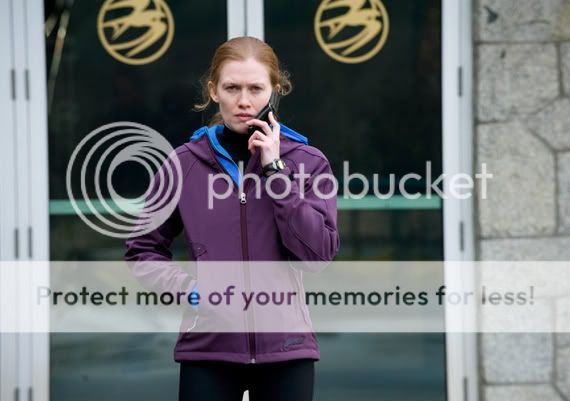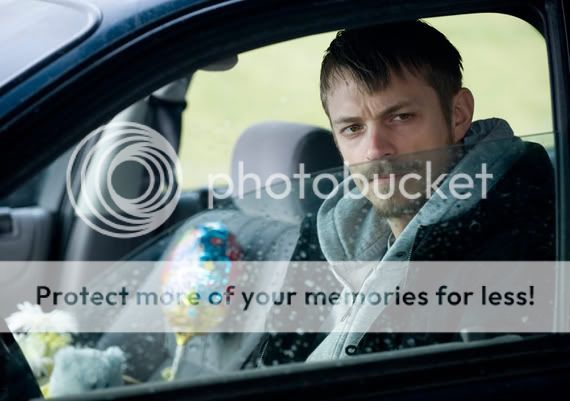The synopsis for this episode would have made anyone think that “Missing” was strictly going to be a filler episode; which it was, but that didn't stop it from being better than most in the series. Switching things up by focusing solely on Linden and Holder was a wise choice, as was the character development and backstory the writers finally gave the audience. It's just a shame it didn't come much sooner in the series.
Day
twelve picked up with Linden investigating the casino the Adela ferry
led her to. The staff was tight lipped, but one confirmed that Rosie
was there on the Friday in question despite trying to do just the
opposite. Though Linden did give a convincing performance as the
take-no-guff detective, being out of her jurisdiction meant attitude
alone wasn't enough. In lieu of waiting for a federal warrant,
Linden decides to requisition the footage from the ATMs around the
casino to see if they can spot Rosie using one. The detectives would
still have to wait most of the day for the D.A. to file the warrant,
which was the perfect opportunity for Linden's son to run off,
leading her and Holder to spend the day tracking him down. It was
certainly a change of pace to focus an entire episode on Holder and
Linden; with no scenes involving the Larsen's or the Richmond
campaign. If The Killing had
set out with episodes like this for all three story lines then
perhaps the audience wouldn't have been complaining for so long about
not knowing the characters. As such, we're twelve episodes in and
just now learning about these characters' motivations, as well as the
demons they deal with. No matter how overdue it is, there is no
denying it's nice to see.

Holder
was the most likeable he's been in the entire series, showing a side
we've only glimpsed once before at his Narcotics Anonymous meeting.
It also didn't hurt that his prying into Linden's life is exactly
what we as the audience would be doing if given the opportunity.
It's made obvious early on in the episode that Holder had other plans
for the day besides chauffeuring Linden. After leaving a message for
a woman named Liz and her two kids, we find out through a
conversation he has with Linden that Liz is his sister and had more
of a hand in raising him than Holder's mother did. Though not much
is said, Holder is clearly trying to repair the damage his drug use
did to their relationship by attending a parade with them.
Kinnaman's acting really shined with Holder's switch from his usual
“street” demeanor to someone struggling with whether to help a
friend or help himself reconnect with his loved ones. Though Holder
gave good performances throughout the episode, he really impressed in
the scene where he let's Liz know he won't make it to the parade
because he has to see it through with Linden. Seeing him make that
sacrifice was the first indication that him and Linden could actually
be partners that actually have each others' back. It's made
better by it being unclear if Holder is really ready to reconnect
with his family or perhaps not ready to deal with the shame and guilt
that would resurface just from looking at them. His vocabulary and
behavior still often reflect that of a fifteen year old punk (which
isn't getting any less annoying to watch) but as we learn more about
the life he's lead and the kind of man he is, those character flaws
become easier to forgive because it's finally being made clear they
aren't all there is to Holder.

Enos managed to top her performance from the last episode, which was good since “Missing” hinged on Linden and the search for her son. The character hasn't gained any love though for competing with Mitch Larsen in the “world's worst mother” category. Unlike Mitch, however, Linden has been giving us both a range in acting, as well as insight into her past why she does it, at least for these last two episodes. Finding out Regi was Linden's social worker and that Linden had bounced around foster homes her entire childhood in itself would have made the lack of plot progression worth it, but the writers outdid themselves both in how it was disclosed and in timing it with another reveal. Linden's line about the worst part of foster homes being trying to find the light switches every time she moved was poignant, and it's the kind of dialogue the writers have rarely been able to produce thus far. Even the cinematography saw improvement with a brilliant zoom out of Linden in her empty motel room; and the shot of her and Holder in the hallway near the end of the episode. It also was impossible not to sympathize with her when it's revealed a previous case of her's ended with a young boy winding up in foster care after his father killed his mother. Again, this kind of writing hasn't been evident through most of The Killing and was a welcome breath of fresh air in a series that went stale before it even finished it's first season.
Both actors were also excellent in the inevitable fight that would occur when two people spend that much time together. Holder gained points for not sugar-coating that Linden was a bad mother, and Linden for giving a realistic portrayal of that knee jerk defense mechanism that any mother would experience when their parenting skills are called in to question. There was one big negative standout in the episode however. The writers were very lazy in using the cliched and terribly convenient plot device of a boy fitting Jack's description being found dead, thus forcing Linden and Holder to rush to the scene. Linden's breakdown after the body is identified as someone else was at least well done on the actress's part, but couldn't save such a shallow attempt at creating suspense. As it would turn out, Holder was right all along; a boy needs his dad, who Jack was with the entire time. This hopefully means the writers will be delving further into Linden's past with the final episodes, as the times that they have done that are proving to be the best of the series.
The final scene saw the one tiny advancement in the case that “Missing” would provide. Holder heads to the station to review the footage from the ATM's and discovers Rosie using one of them. When any other time that kind of progression would be the only positive, it barely merits mentioning in an episode that did personal drama so well. It will be interesting to see as the first season reaches it's climax if the show can continue to improve. Because for once, it was the episode's quality and not a big cliffhanger ending that built anticipation for the next installment of The Killing.